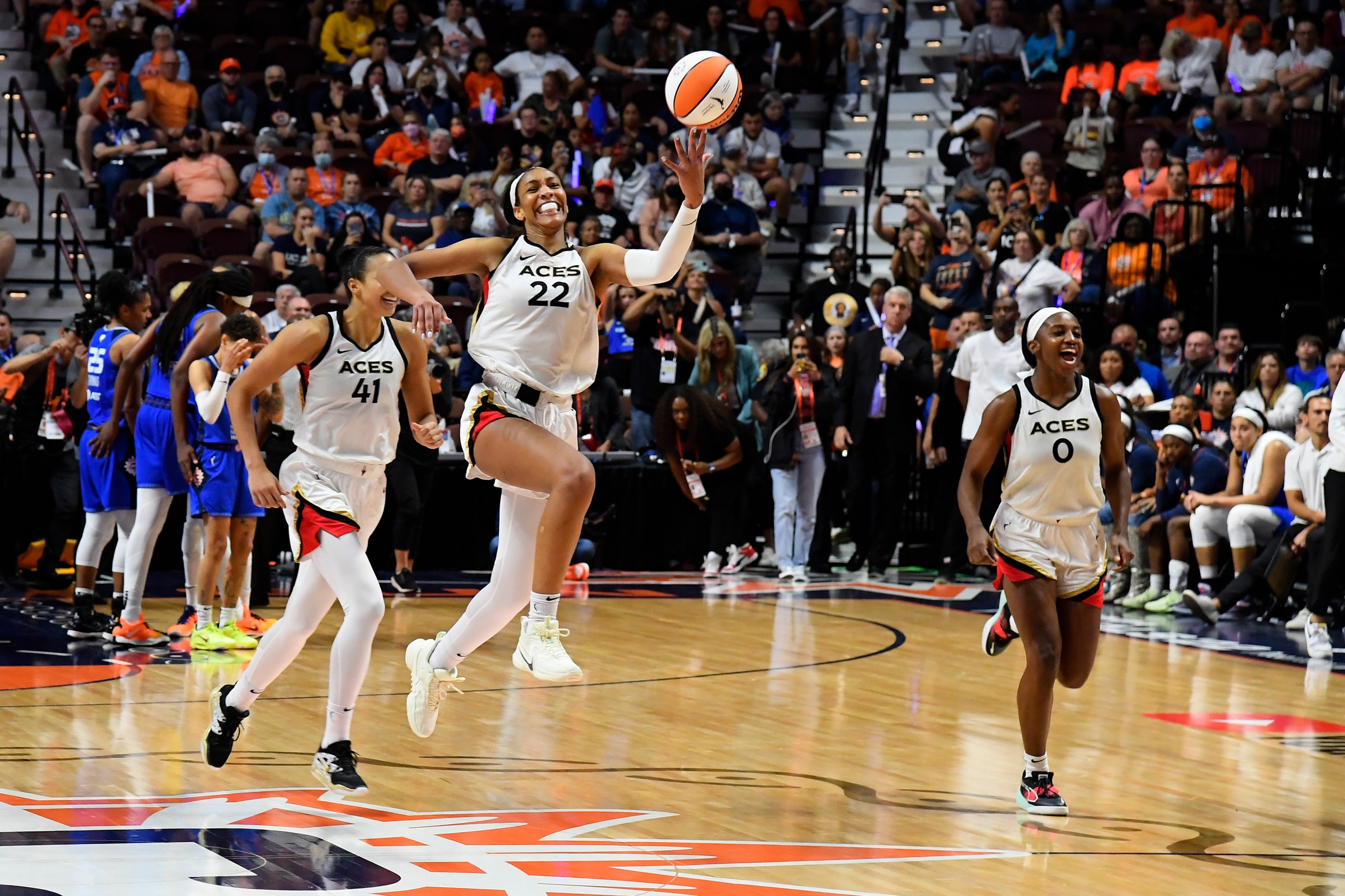All season long for the Las Vegas Aces, the starters were a (good, in the metaphorical sense) problem and the bench was a (bad, in the literal sense) problem. The team befit the city: dynamic stars at the forefront and not much to work with on the boring margins. Everyone wondered how they'd weather any injuries or foul trouble, how far a team built like this could go in the postseason, where they'd been limited by a lack of depth before. So naturally, after all the ado, it was Riquna Williams, a sixth woman in the twilight of her career, hitting the three fourth-quarter shots that made the Aces WNBA champions on Sunday in Connecticut.
Riquna Williams with 8 STRAIGHT points in the clutch 🔥pic.twitter.com/Yz7jS0qk1C
— ClutchPoints (@ClutchPointsApp) September 18, 2022
It wasn't Kelsey Plum, though if there were any last flickers of hope for the Connecticut Sun, down four with 30 seconds left, she killed them. Plum barreled through the paint, paused a moment, and then hit one final shot as she twisted mid-air. It wasn't Dearica Hamby, slowed down by a recent injury but still her usual energetic self. It wasn't Jackie Young. She mostly played the facilitator in this game, leading the Aces out in transition. Two years ago, the soft-spoken guard was the player teams left open in the corner. On Sunday, her 4-for-14 line represented an unusually bad shooting night. I want to use a time machine to tell my past self that Jackie Young takes 14 shots in WNBA Finals games now; this is way cooler than flying cars. It wasn't A'ja Wilson, who was quiet on offense in Sunday's game, but reserved her clutch moments for defense, where she shone all season. And yes, somehow it wasn't Chelsea Gray. Voted Finals MVP, Gray closed out what may have been the best offensive performance in playoff basketball history. She averaged 21.9 points on 60.3 percent field-goal shooting and 53.7 percent shooting from three. Your eyes weren't wrong: She did actually shoot worse when her shots were uncontested. She thrived with a hand or two in her face, with only an inch of space left to get the shot off. Every single one of those points was earned in the most difficult, ridiculous way. But it wasn't her making the three shots that made the Aces champions.
Nope, it was Williams making them—a pair of threes and a long two in the last two minutes to neutralize a worrying Sun run. Turns out the cliché is true: Championship teams find ways to win. No matter how weird. No matter how ugly. No matter how uncharacteristic. In the fourth quarter, the game seemed to turn on one play: Plum fouled DeWanna Bonner, closing out on her recklessly as she attempted a three. A flagrant foul was given and a five-point Sun possession ensued, and the Aces lead shrank to one with just under three minutes left. A minute later, Connecticut had taken a two-point lead. The Sun operate like quicksand, immobilizing opponents and dragging them down into the low-scoring, grit-it-out muck. It's annoying and total bullshit, but also the strategy works well. You can't beat the Sun without becoming them first, and the Aces of years past were never particularly good at those kinds of adjustments.
For a team only in its fifth year in existence, they'd developed the dreaded "regular season merchant" label pretty quickly. Last year, Vegas's sloppy defensive miscues let the Phoenix Mercury escape with a Game 5 semifinals win. Gray said Sunday night that she still replayed all the possessions from that loss in her mind. "It hurts so much because it was the little things that made us lose," she said. "We had a squad. We were ready for the moment. It's just the little things that hurt us." Even in Game 3 of this Finals series, they'd seen their offense sputter. So in those shots from Williams and in the solid, quiet games from the Vegas starters was the sign they'd matured, and were finally going to win their long-awaited title. The Aces abandoned themselves for a moment, and became a clunky-shooting but scrappy-defending team with a weapon off the bench. They got the little things right when it mattered. "We got out of the mud," Wilson said.
To get her team out of the mud in those final minutes, Becky Hammon gambled with a smaller lineup that could have had trouble defending the Sun's bigs but ended up rewarding her faith on the offensive end. "I felt like if we could scrap and just dig out balls on the other end, that they would have a tough time guarding us down there," said Hammon, no longer the best WNBA player to never win a championship. Hammon took over a team with potential—for the Aces, a title has always been a matter of when and not if—and she was quick to credit her predecessor, Bill Laimbeer, for building the roster and laying the foundation. (He was sitting courtside.) Still, in so many ways, Sunday's felt like the sort of game last year's Aces lose, a game won on adjustments and little things, one no single player dominated. A'ja Wilson pulled down the final rebound as the clock ran out. She and her teammates sprinted back toward the Vegas bench. It was the sweetest sight in sports: potential fulfilled.






